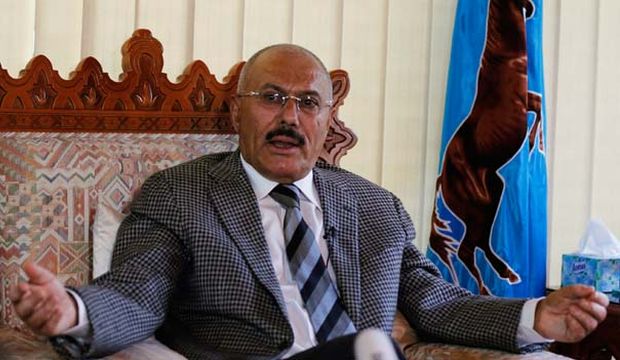
Yemen’s former president Ali Abdullah Saleh talks during an interview with Reuters in the Yemeni capital Sana’a, Yemen, on May 21, 2014. (Reuters/Khaled Abdullah)
The US Treasury imposed asset freezes on Saleh and Houthi commanders Abdul Khaleq Al-Houthi and Abdullah Yehya Al-Hakim, in conjunction with the UN Security Council’s similar sanctions on the men announced on Friday, which also included travel bans.
“As a result of today’s action, all assets of those designated that are located in the United States or are in the control of US persons are frozen, and US persons are generally prohibited from engaging in transactions with them,” the Treasury Department said in a statement on Tuesday
Undersecretary for Terrorism and Financial Intelligence David S. Cohen said in the statement that the US government and the international community continued to support Yemen’s political transition process and economic reform measures, and would “hold accountable anyone who threatens the stability of Yemen and the efforts of the Yemeni people to accomplish a peaceful political transition.”
The US alleges that as of fall 2012—following Saleh’s leaving power earlier in the year in February—the ex-president “had reportedly become one of the primary supporters of violence perpetrated by individuals affiliated with the [Houthi] group.”
It said that as of September 2014, Saleh had “reportedly . . . been destabilizing Yemen by using others to undermine the central government and create enough instability to threaten a coup.”
A September UN report on Yemen alleged that Saleh supported the “violent actions of some Yemenis by providing them with funds and political support, as well as ensuring that others continue to contribute to the destabilization of Yemen through various means.”
Houthi military commander Hakim is accused of plotting a coup against President Hadi. The US says that prior to the Houthis’ takeover of Sana’a in September, he met with “military and security commanders, tribal chieftains, and leading partisan figures loyal to former Yemeni president Saleh” to coordinate plans for the group’s advance on the capital.
It also accuses him of leading violent efforts by the Shi’ite group to take over the Amran governorate, including overrunning the Yemeni army headquarters there.
“His role was to organize military operations so as to be able to topple the Yemeni government, and he was also responsible for securing and controlling all routes in and out of Sana’a,” the statement said.
Abdul Khaleq Al-Houthi is accused of leading a number of violent acts committed by the Houthi movement throughout the country. The US accuses him of ordering an attack in late September on US diplomatic facilities in Sana’a.
The sanctions from the US and the UN have thus far targeted only individuals and not groups or parties.
Speaking to Asharq Al-Awsat, a source from the US Department of State, who requested anonymity because he was not authorized to brief the media, did not comment on whether this would change in the future, but added that the sanctions were a warning to “all factions, groups and parties in the country.”
The source said the US called on all Yemeni factions to abide by the decisions of the Gulf Initiative—which helped secure the transfer of power upon the resignation of Saleh in 2012—and the Peace and Cooperation agreement signed between President Abd Rabbuh Mansur Hadi and the Houthis on September 21, following the latter’s takeover of the Yemeni capital and other areas in the country.
The agreement stipulated that the Houthis vacate all government property and state buildings they had occupied in Sana’a, and return all weapons, ammunition and military equipment seized by its members following a series of month-long mass protests organized by the group to demand a new government and the reinstatement of energy subsidies.
The US, UN, President Hadi, and several Gulf countries accuse Saleh and members of the military and security apparatus still loyal to him of allying with the Houthi movement, easing their advance across the country amid a marked security vacuum.
Mohamed Ali Saleh contributed reporting from Washington.

Trackbacks/Pingbacks